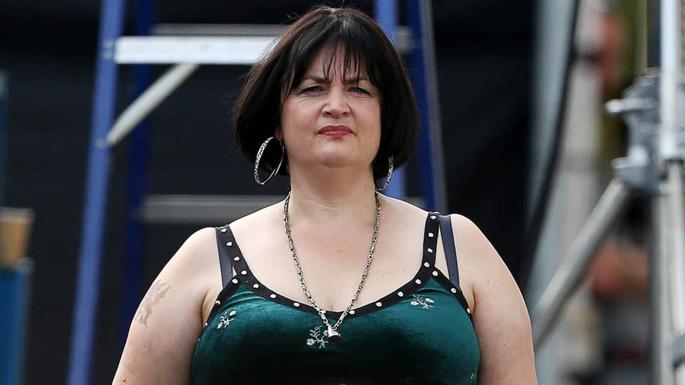Gavin and Stacey Christmas special sparks hurt and anger after broadcasting the word ‘f*ggot’
The row over the BBC's refusal to censor the anti-gay slur in The Pogues' 'Fairytale of New York' continues.
By Will Stroude
Well, we actually made it all the way to Christmas Day this year, but the row over the word ‘f*ggot’ in The Pogues’ ‘Fairytale of New York’ has reared its ugy head once again.
This time, it was the Gavin and Stacey Christmas special sparking fury, as the beloved BBC sitcom returned for an hour-long feel-good festive offering on Christmas Day (25 December) before cheerily broadcasting the anti-gay slur into millions of homes across the country.
The one-off episode saw characters Nessa (Ruth Jones) and Bryn (Rob Brydon) perform a rendition of ‘Fairytale of New York’ in front of their friends and family, leaving the original lyrics, homophobic slur and all, in tact.
The word ‘f*ggot’ was even acknowledged by the characters, with Gavin (Matthew Horne) exclaiming ‘Ooooh!’ upon hearing it.

The fact Smith (James Corden) declared “I love this part” as Bryn launched into the song’s second verse did little to dispel fears that the scene helped normalise a word that is the last thing many gay men hear before they are violently beaten, bullied or abused.
The sight of a pub full of mainly straight characters revelling in the opportunity to bellow the word ‘f*ggot’ unchallenged will be one that’s sadly familiar to many LGBTQ people at Christmas.
Many viewers felt the slur’s inclusion was an unneccessary and unconfortable writing choice by Gavin & Stacey creators James Corden and Ruth Jones, particularly given the passionate debate about censoring the term that has rumbled on for the last few years.
“I love Gavin and Stacey, but including the “f*ggot” line in the Fairytale of New York singalong is careless and a real missed opportunity”, wrote one viewer.
I love Gavin and Stacey, but including the “f*ggot” line in the Fairytale of New York singalong is careless and a real missed opportunity. Imagine if Nessa had simply said “Oh! Bryn! To be honest, at the end of the day like, I feels uncomfortable using that word in 2019.”
— Little Saint Nick Levine ☃️ (@mrnicklevine) December 25, 2019
“Imagine if Nessa had simply said “Oh! Bryn! To be honest, at the end of the day like, I feels uncomfortable using that word in 2019.”
Another added: “I’m instinctively cautious about censoring art but they didn’t even have to. They could have easily cut to a conversation in the pub to mask the f-word.
“Would side-step any PC gone mad narrative while also minimising offence caused surely?”
One viewer took to Twitter to point out the double standard that remains when it comes to broadcasting racist slurs in songs versus the word ‘f*ggot’ in ‘Fairytale’.
“For most gay men the ‘F’ word is the same as the ‘N’ and ‘P’ words are to the BAME [Black, Asian and minority ethnic] community”, they wrote.
@JKCorden @BBCOne For most gay men the ‘F’ word is the same as the ‘N’ and ‘P’ words are to the BAME community. FTONY is a beautiful song but that lyric has obvious homophobic connotations and I think it was a bad decision to use it #GavinandStacey
— Lip Sanders (@LipSanders) December 26, 2019
“[Fairytale of New York] is a beautiful song but that lyric has obvious homophobic connotations and I think it was a bad decision to use it.”
Many people – gay men included – argue that ‘Fairytale of the New York’ should remain unbleeped on TV and radio, but the sad fact is that if an LGBTQ youth is being called a f*ggot in the classroom come January because someone heard it said on Gavin and Stacey, those people won’t be paying the price for making the term seem acceptable in public.
And, despite arguments that The Pogues used the old Irish meaning of the word ‘f*ggot’, meaning ‘lazy’, that is patently not how the lyric is understood by the majority of listeners – or those who will go on to use the word as they abuse gay men out the window of their car.
Sadly, the writers of Gavin and Stacey and the BBC saw this row coming, and still decided to include the extended scene rather than cut away and side-step this row entirely.
Speaking before the episode’s broadcast, Jones said: “It is a different climate. But we have to remain true to the characters, to who they were.

“Characters in Gavin and Stacey are kind and big-hearted, I believe. So I think no one is going to be intentionally hurtful.
“But by the same token, they’re not necessarily going to be completely politically correct or be aware of political correctness.”
In a statement, the BBC said: “[The track] is a very popular, much-loved Christmas song played widely throughout the festive season, and the lyrics are well-established with the audience.”
